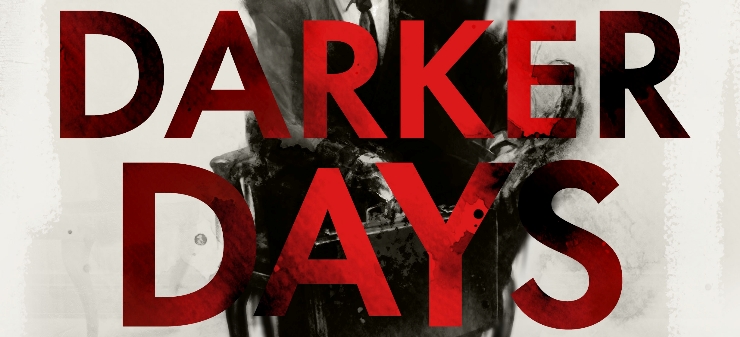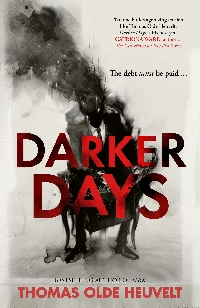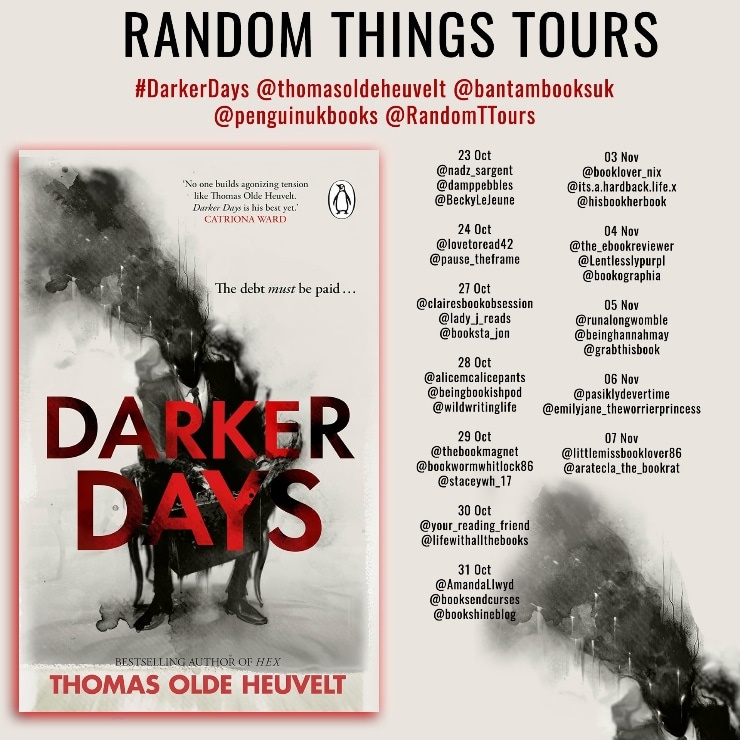Blog tour: Darker Days by Thomas Olde Heuvelt

This post is part of a blog tour organised by Random Things Blog Tours. I received a free copy of the book in return for an honest review.
‘Welcome to Bird Street. The lawns are manicured, the kids are gifted, the neighbours are always smiling – and every November, someone must die.
‘Nestled in the heart of Washington, Bird Street is the kind of place realtors dream about and horror stories are born in. Its residents are wealthy, beautiful, brilliant.
‘For over a century, the street’s charmed existence has come at a terrible cost: the pact they made. The Darker Days come like clockwork because they are the price of the occupants’ perfect little lives. Usually, the debt is paid quietly, even gracefully. A terminally ill patient, a willing elder, someone ready to leave this world.
‘But this November, something goes wrong. The chosen sacrifice runs. The stranger sent to collect the debt decides to linger. And the shadows that haunt Bird Street begin to whisper secrets no homeowners’ association could ever contain.
‘As guilt festers and paranoia spreads, the neighbours must confront a chilling truth: this year, the Devil wants more than just a life. He wants in.’

In Darker Days, by Thomas Olde Heuvelt, we meet the residents of Bird Street, who are a preternaturally happy and successful bunch – for eleven months of the year, at least.
Every November, they must pay a shadowy, strange figure known as the Accountant for their continued good fortune, in the form of a human sacrifice in the woods behind their houses, as well as the titular Darker Days, when their previous tributes come back to haunt them, their luck reverses, and their worst selves come to the fore.
So far, every year the neighbours have managed to find someone who’s willing to be dispatched: a terminally ill person who’d rather be euthanised than suffer a painful, drawn-out death. But this time around, in 2022, all their preferred candidates fall through, leading them to take such desperate measures that they can no longer convince themselves they’ve acted mercifully or ethically.
The story focusses on the Lewis da Silva family – mum and dad Luana and Ralph, and children Kaila (15) and Django (10). Like the other children on the street, the younger Lewis da Silvas are precociously talented, at diving and piano respectively, but unlike their peers, they only exist due to the Accountant, as Luana was found to be infertile before she signed the pact. Accordingly, the Accountant takes a special interest in the pair, especially as Kaila is now on the cusp of initiation.
I enjoyed reading Darker Days. I was absolutely agog as worse and worse misfortunes struck the characters, they sunk to lower and lower depths (quite literally, on one occasion), and Kaila gradually became aware of the precarious foundations her mostly-charmed life was built on.
I found the concept of the woods behind Bird Street particularly imaginative and compelling: not only are they where members of the pact kill and bury their sacrifices, but the victims’ tortured souls stay there and make their presence known every November (the residents have to board up any windows that face the woods, as well as obscure all reflective surfaces, where the dead can also appear), and there’s an element of geographical weirdness too, including at least one major portal.
I thought the logic of the Accountant was pretty solid: he may be skin-crawlingly creepy and odious, but you can’t say he doesn’t uphold his side of the bargain to the letter. Without giving too much away, by the end, the pact members’ descent into depravity takes on a life of its own (as the characters keep saying, luck is one thing, and choices are another) that disgusts even him, and he goes rather Old Testament God/bored The Sims player on them.
While the premise of Darker Days has rightly been likened to Shirley Jackson’s famously disturbing short story The Lottery, the execution put me in mind of her first novel, The Road Through the Wall – albeit with a generous added topping of overt horror!
Like their counterparts on Jackson’s Pepper Street, the residents of Bird Street are very self-satisfied and consider themselves to be decent people, but you needn’t do much more than scratch the surface to reveal the nasty sides of even the most pleasant-seeming characters, the mental gymnastics they perform to justify their annual payment, or what they actually think of one another, echoing the earlier novel’s unsettling atmosphere. As you might expect, the Accountant amplifies and exploits these to maximum effect for 30 days a year.
The author’s choice to focus on the Lewis da Silva family is an inspired one. Patriarch Ralph was born into a Bird Street family and initiated, as is customary, at the age of 16. As a judge and devoted father, he starts off as a relatively sympathetic character, even acting as a moral compass for the street, but that makes his fall from comparative grace all the more shocking. Luana’s story, meanwhile, highlights just one way an outsider might be lured into making a pact with the Accountant and marrying into Bird Street.
Kaila and Django’s characters strike the right balance: they’re high achievers but not big-headed (and while they have (un)natural aptitudes, these aren’t sufficient on their own and they are required to work on them!), and pleasant without being unrealistic (both have their moments of brattiness, but there are worse kids on Bird Street). I did feel that Kaila was lacking in close female friends, though she certainly has the Devil’s luck when it comes to boyfriend Jax, who’s remarkably patient and selfless for a teenage boy.
The kids are also compelling reasons for Ralph and Luana to stay put: members of the pact are free to leave, but their fortunes immediately dive to the level they would have been otherwise, with dramatic, and often tragic, results. As Kaila is bipolar, leaving the street could have especially dire consequences for her. There are additionally similarities between her and the last-resort victim for 2022, causing further inner turbulence for Ralph in particular, due to his direct involvement in the sacrifice.
Darker Days is enjoyably sinister and compelling.
